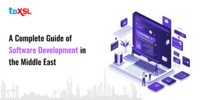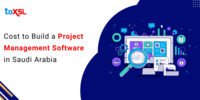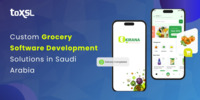- Nov 21, 2025
Share this post on:

The global custom software market is estimated to reach USD 43.16 billion by 2030, growing at a CAGR of 22.65%. Did you know that by this year, over 70% of new applications will be built using low-code or no-code technologies, and more than 90% of businesses will rely heavily on cloud computing?
In 2025, driven by rapid digital transformation and increasing user expectations, software product development services have become central to business success. Whether you aim to launch a new app, optimize existing software, or innovate with custom solutions, navigating the development landscape strategically is essential.
Key Takeaways
- Embrace agile and AI-driven software product development to accelerate timelines and improve quality.
- Prioritize cloud-native and modular architectures for scalable, flexible, and resilient software solutions.
- Start with user-centered design and build MVPs to validate ideas quickly and adapt based on real feedback.
- Integrate security and regulatory compliance early in the development lifecycle to mitigate risks.
- Partner with expert software development companies to ensure project success and innovation capacity.
Software product development is the process of designing, creating, deploying, and maintaining software tailored to meet specific business needs or market demands. From initial idea generation to a fully functional digital product, this lifecycle involves collaboration between business stakeholders, developers, designers, and end-users.
Businesses tend to partner with a software development company or custom software development companies to leverage expert skills, timely delivery, and reduced risks. This partnership ensures the product is aligned with business goals and offers an excellent user experience.
Steps to Hire the Best Software Development Company
A successful product requires thorough planning and precise execution. The following stages outline the typical flow:
1. Ideation and Requirement:
The journey begins with a clear product vision. Stakeholders define the problem the software will solve, its purpose, target audience, and core features. This stage demands deep market research and stakeholder collaboration to ensure that the product concept is viable and aligned with business objectives.
2. Planning and Roadmap Creation:
Next, a detailed development plan is formulated. This includes timelines, budgeting, technology choices, resource allocation, and risk analysis. The roadmap translates vision into actionable milestones, keeping the team focused and flexible to adapt to market feedback.
3. Design and Prototyping:
User-centric design is critical. Prototyping tools help create initial versions of the user interface and experience, enabling early testing and refinement. This phase addresses usability, accessibility, and aesthetics to build engaging software.
4. Development:
This phase transforms designs into working software. Agile software development methodologies are widely favored, enabling incremental delivery and regular feedback incorporation. Whether working with custom software development services or in-house teams, maintaining code quality, security, and scalability is paramount.
5. Testing and Quality Assurance:
Before launch, rigorous testing is performed to identify and fix bugs, optimize performance, and ensure compliance with standards. Quality assurance enhances software reliability and minimizes post-release issues.
6. Deployment and Maintenance:
Post-development, the software is deployed to production environments. Continuous monitoring, user feedback collection, and ongoing updates ensure the product evolves with the market trends and user needs.
Why Choose Custom Software Development?
Off-the-shelf solutions often fall short in addressing unique business workflows and requirements. Custom software development empowers organizations to build tailored tools that integrate seamlessly with existing systems, improve operational efficiency, and provide competitive advantages.
Custom software development companies bring specialized expertise to craft bespoke solutions. From startups to large enterprises, investing in custom software is now fundamental to innovating and sustaining growth.
Benefits of Partnering with a Software Development Company
Partnering with a software development company offers businesses a broad set of transformative advantages in 2025. These extend far beyond basic cost savings and can support both immediate project needs and long-term digital strategies.
Cost Efficiency:
Companies can significantly reduce their operational costs, avoiding expenses related to salaries, recruitment, training, benefits, and workplace infrastructure. Engaging a software development partner removes the burden of capital expenditure, as the external team is already equipped with specialized domain experts and tools, thus maximizing value for every dollar spent.
Access to Global Talent:
Partnering with an external firm instantly expands a business’s access to expert developers, QA engineers, DevOps specialists, data scientists, and more, often with deep experience across various industries. This diversity fosters creative thinking, encourages the adoption of best practices, and raises the overall standard of delivery.
Rapid Capacity Expansion:
With market demands rapidly shifting and technology evolving, scaling your team on short notice is a necessity. Trusted software development partners offer ready-to-go teams and can quickly ramp resources up or down, aligning with your project’s timeline or business needs, without lengthy hiring cycles.
Accelerated Time to Market:
Bringing a new product or feature to users swiftly can be a game-changer. Experienced development companies operate with established processes, collaborative workflows, and agile methodologies, all designed to streamline development, avoid bottlenecks, and accelerate delivery while maintaining high quality.
Risk Reduction:
Reliable partners bring proven risk management strategies, robust quality assurance practices, and clarity to project scope and deliverables. Their experience allows them to proactively identify, manage, and mitigate risks early in the development cycle, which is especially important with innovative or experimental projects.
Access to Latest Technologies:
External partners are motivated to stay current with new technologies, frameworks, and security standards because their reputation depends on it. They also ensure compliance with industry regulations, offering peace of mind and future-proofing your solution.
Ongoing Support:
The relationship doesn’t end at deployment. Many software development companies provide ongoing maintenance, updates, and post-launch support, ensuring your digital products continue to evolve and perform optimally. Knowledge sharing, process refinement, and constant communication between teams help raise standards and drive continuous innovation.
Shared Risk, Shared Reward:
Strategic partnerships allow risks, expenses, and even rewards to be shared. This model creates mutual accountability, increased alignment, and a collective focus on success.
Enhanced Innovation:
Through collaboration, your internal teams gain exposure to new ideas, transferable skills, and leading-edge technologies. This cross-pollination fuels innovation and enables greater agility as business needs or technology trends change.
Top Software Development Methodologies
Top Software Development Methodologies reflect a blend of flexibility, collaboration, automation, and intelligence. The most prominent and effective methodologies businesses rely on include:
Agile Methodology: Agile remains the superstar due to its iterative, flexible approach. It focuses on delivering working software in short sprints (1-4 weeks), regularly incorporating user feedback to adapt quickly to change. Agile fosters transparency, collaboration, and faster time-to-market.
Scrum Framework: A structured subset of Agile, Scrum emphasizes clear roles like Product Owner and Scrum Master, with frequent ceremonies such as daily stand-ups and retrospectives. About 87% of teams use Scrum due to its ability to handle complex projects with continuous delivery and stakeholder involvement.
DevOps: This methodology bridges development and operations teams to automate software delivery and infrastructure changes via continuous integration and continuous deployment (CI/CD). DevOps enhances collaboration, accelerates release cycles, and improves system reliability.
Lean Software Development: Inspired by lean manufacturing, this focuses on eliminating waste, optimizing resources, and delivering only what is valuable to customers. Lean methodology excels in improving efficiency and maintaining quality with limited resources.
Waterfall Model: Though older and more rigid, the Waterfall is still relevant for projects with well-defined requirements and regulatory compliance needs. It follows a linear, sequential process where each phase must be completed before the next begins.
Software Development Cost in Dubai
The cost to develop software can range widely based on the type, complexity, team structure, and geographic location. For a simple product or MVP (Minimum Viable Product), costs may start around $15,000-$25,000, while more complex enterprise systems can exceed $200,000 and sometimes reach into the millions. Factors affecting the total price include the chosen technology, the scope of features, integrations with other systems, compliance needs, and the development team's expertise and rates. Below is a comparative table summarizing typical cost ranges for different types of projects and scenarios.
Project Type | Estimated Cost (USD) | Typical Features/Complexity | Average Timeline |
Simple MVP/Prototype | $15,000 – $60,000 | Basic features, limited integrations | 2–4 months |
Basic Web or Mobile App | $20,000 – $80,000 | Core functionalities, simple UI/UX | 3–6 months |
Mid-sized Custom Application | $60,000 – $200,000 | Multi-user roles, dashboards, API, workflows | 4–10 months |
Enterprise/Complex Solution | $200,000 – $1M+ | Multi-module, high security, advanced logic | 8–18+ months |
Conclusion
ToXSL Technologies, a custom software development company in UAE, understands that in today’s fast-paced digital ecosystem, having reliable and tailored software solutions is not just an advantage but a necessity. Leveraging comprehensive software product development services allows businesses to turn innovative ideas into market-ready products efficiently and securely.
With our expertise in custom software development, agile practices, and commitment to quality, ToXSL Technologies partners with businesses to deliver next-generation software that meets unique needs and drives growth. Contact us to transform your vision into a powerful digital reality.
Frequently Asked Questions
1. What is software product development, and why is it important for businesses?
Software product development is the process of designing, building, testing, and maintaining software tailored to solve specific business problems or meet market needs. It's essential because it drives innovation, improves efficiency, and provides a competitive advantage in the digital economy.
2. How long does it typically take to develop a software product?
Development time varies by project complexity, but generally ranges from 2 to 18+ months. Simple MVPs or prototypes take a few months, while complex enterprise solutions with multiple integrations can take over a year.
3. What are the benefits of engaging a custom software development company?
Partnering with expert development companies grants access to skilled resources, proven methodologies, faster delivery, risk reduction, and ongoing support, enabling businesses to focus on core activities while ensuring quality software solutions.
4. What development methodologies and technologies should businesses expect?
Agile, DevOps, cloud-native, AI-powered automation, and security-first approaches dominate software development. Modern tech stacks include languages like Python, Java, and frameworks such as React and Flutter for building scalable, secure, and user-friendly solutions.









